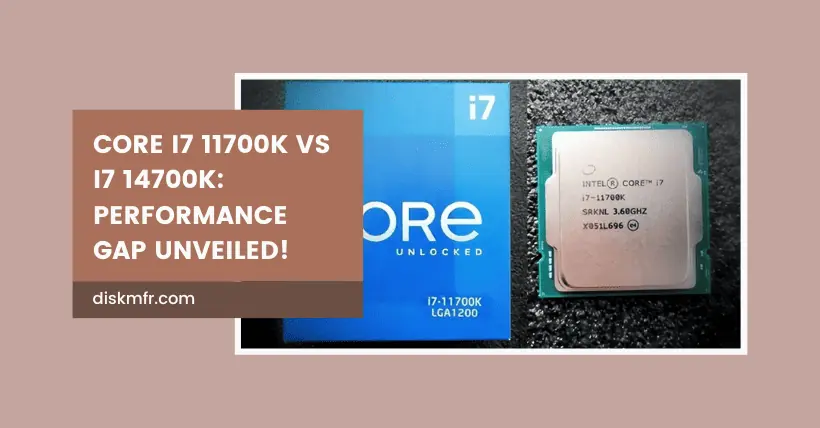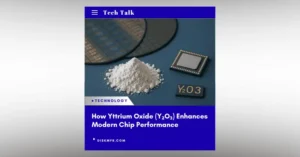In the currently released 14th generation of Intel’s Core processors, the Core i7-14700K is a slightly ‘special’ model.
Compared to the previous generation’s Core i9-14900K and Core i5-14600K, which only saw a slight increase in standard operating frequency and maximum operating frequency, with no significant changes in other aspects, the Core i7-14700K, in contrast to the Core i7-13700K, has an additional four small cores and four threads. Please refer to Figure 1.
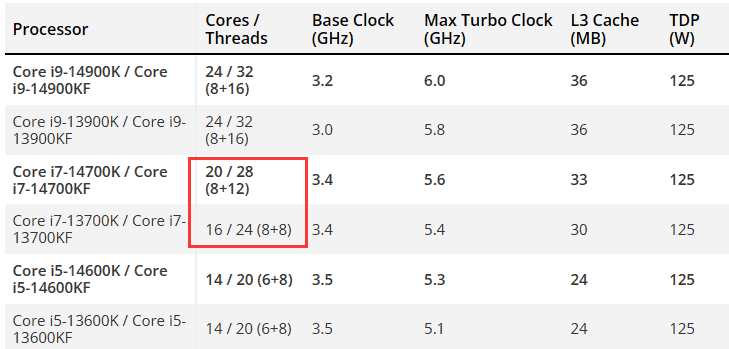
The comparison of the performance between the Core i7-14700K and Core i7-13700K has been shared before. This time, I’ll be sharing the performance comparison between the Core i7-14700K and Core i7-11700K. The goal is to assess how much difference exists in the performance of these two processors. If you’re currently using the Core i7-11700K, we’ll evaluate whether it’s necessary to upgrade to the Core i7-14700K.
01
Parameter Comparison of Core i7 11700K vs i7 14700K
Core i7-11700K (Released March 16, 2021):
- Fabricated on a 14-nanometer process, featuring 8 cores and 16 threads.
- L2 cache: 4MB, L3 cache: 16MB.
- Standard operating frequency: 3.6 GHz, Boost frequency: 5.0 GHz.
- Power consumption: 125W, suggested retail price: $399.
Core i7-14700K (Released October 17, 2023):
- Manufactured on a 10-nanometer process, equipped with 8 large cores and 12 small cores, totaling 20 cores and 28 threads.
- Standard operating frequency: 3.4 GHz, Boost frequency: 5.5 GHz (maximum 5.6 GHz).
- L2 cache: 28MB, Smart cache: 33MB.
- Standard power consumption: 125W, suggested retail price: $409.
02
Benchmark Performance Comparison of Core i7 11700K vs i7 14700K

On the Cinebench 2024 platform:
- Core i7-14700K: Single-core performance score of 131 and a multi-core performance score of 2021.
- Core i7-11700K: Achieved a single-core score of 92 and a multi-core score of 806.
By calculation, the Core i7-14700K exhibits a 42% higher single-core performance and a 151% higher multi-core performance compared to the Core i7-11700K on this platform. This significant lead in performance doesn’t necessarily imply an equivalent substantial difference in actual gaming performance.
03
Test Platform Configuration of Core i7 11700K vs i7 14700K
The main configurations are as follows:
- Core i7-11700K Configuration:
- Motherboard: ASUS ROG Z590 Maximus XIII Hero
- Memory: 32GB DDR4 3800MHz
- Core i7-14700K Configuration:
- Motherboard: ASUS ROG Strix Z790-E Gaming
- Memory: 32GB DDR5 6000MHz
Other components remain identical across both setups:
- Graphics Card: GeForce RTX 4090
- Hard Drive: Two Samsung 970 EVO M2 1TB drives
- Operating System: Windows 11
04
Gaming Benchmarks of Core i7 11700K vs i7 14700K
Six games will be tested separately, all running at 1440P with the highest quality settings. In the following series of images, the left side represents the Core i7-11700K platform, while the right side represents the Core i7-14700K platform.
Game 1: “God of War”
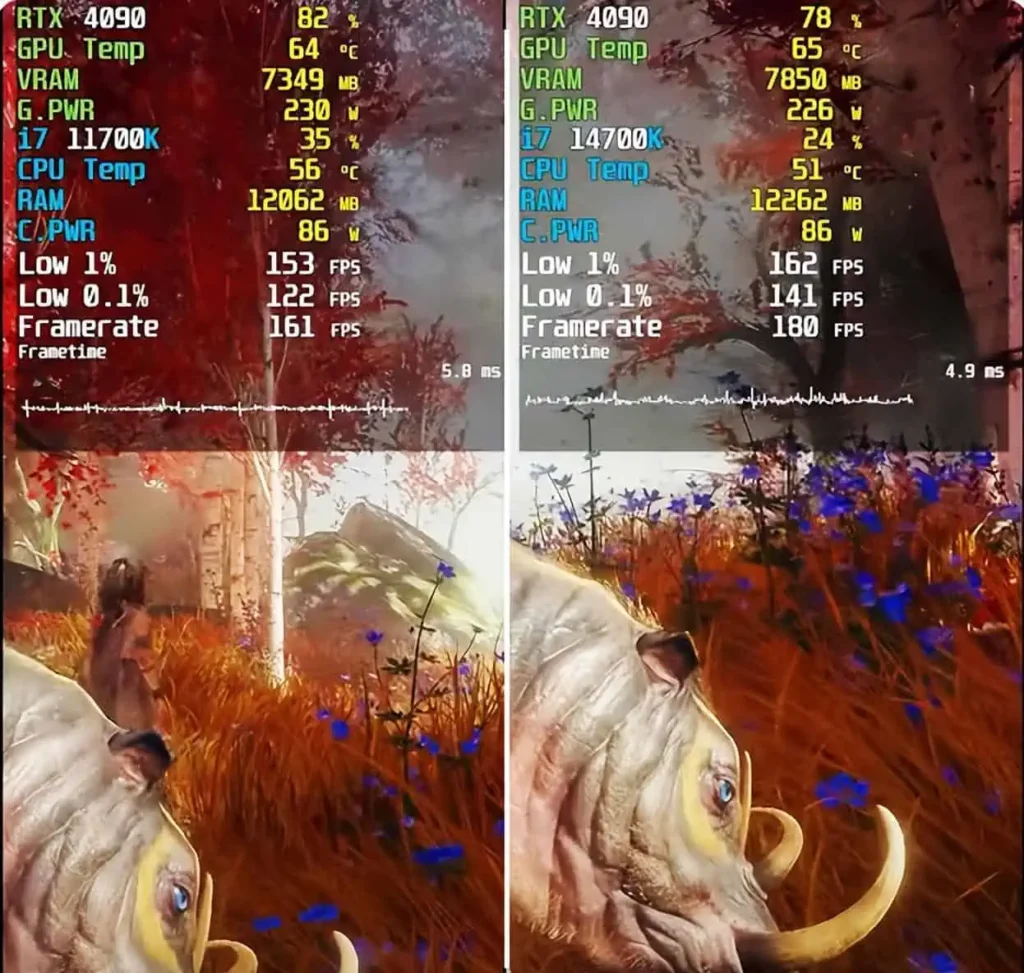
Core i7-11700K Platform:
- Average FPS: 161
- Lowest Instantaneous FPS: 153
- Frame time: 5.8ms
- CPU Usage: 35%
- Power Consumption: 86W
- Temperature: 56°C
- Memory Usage: 12.1GB
- GPU Usage: 82%
- VRAM Usage: 7.3GB
- GPU Power Consumption: 230W
- GPU Temperature: 64°C
Core i7-14700K Platform:
- Average FPS: 180
- Lowest Instantaneous FPS: 162
- Frame time: 4.9ms
- CPU Usage: 24%
- Power Consumption: 86W
- Temperature: 51°C
- Memory Usage: 12.3GB
- GPU Usage: 78%
- VRAM Usage: 7.9GB
- GPU Power Consumption: 226W
- GPU Temperature: 65°C
In this game:
- The CPU usage on the Core i7-14700K platform is 11% lower than the competitor, with memory usage 0.2GB lower.
- GPU usage is 4% lower, but VRAM usage is 0.6GB higher on the Core i7-14700K platform.
- On average FPS, the Core i7-14700K platform outperforms the Core i7-11700K by 19 FPS, with the lowest instantaneous FPS 9 FPS higher.
- The difference in frame time is negligible at 0.9ms.
- Power consumption is equal, but the temperature on the Core i7-14700K platform is 5 degrees lower.
Game 2: “Assassin’s Creed Valhalla”
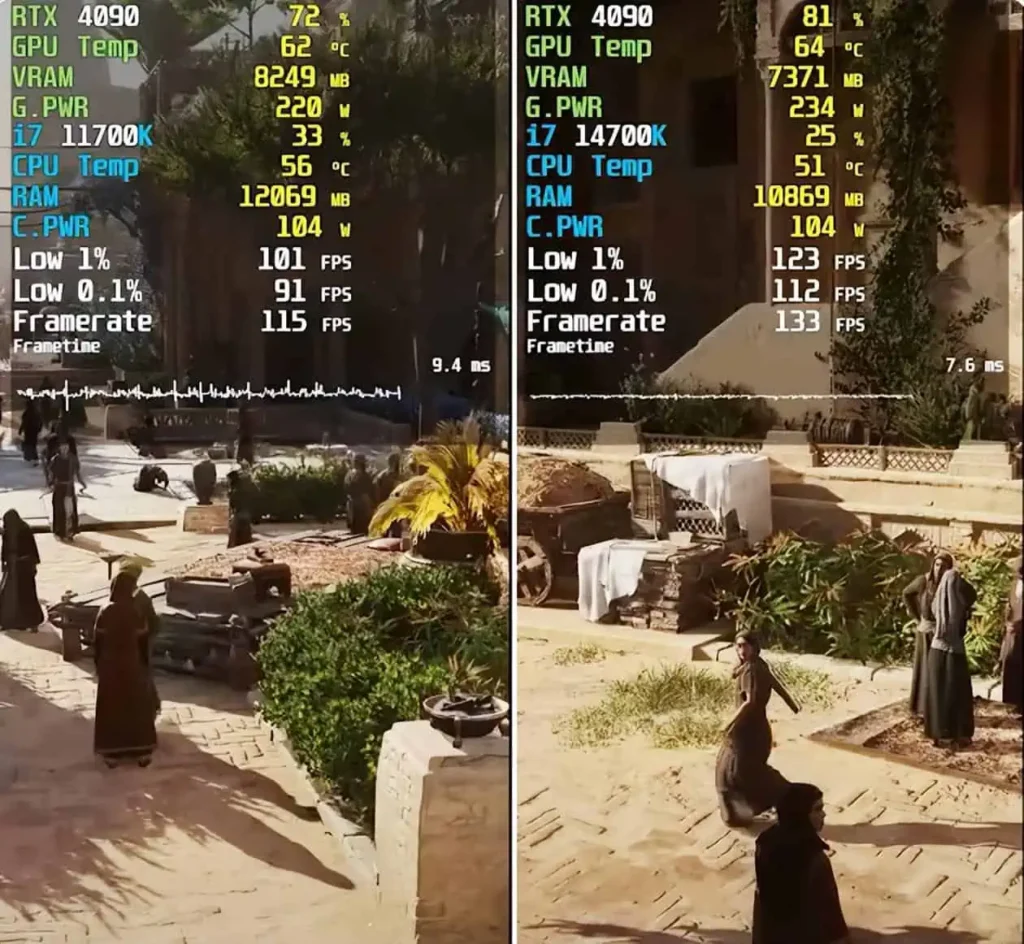
Core i7-11700K Platform:
- Average FPS: 115
- Lowest Instantaneous FPS: 101
- Frame time: 9.4ms
- CPU Usage: 33%
- Power Consumption: 104W
- Temperature: 56°C
- Memory Usage: 12.1GB
- GPU Usage: 72%
- VRAM Usage: 8.2GB
- GPU Power Consumption: 220W
- GPU Temperature: 62°C
Core i7-14700K Platform:
- Average FPS: 133
- Lowest Instantaneous FPS: 123
- Frame time: 7.6ms
- CPU Usage: 25%
- Power Consumption: 104W
- Temperature: 51°C
- Memory Usage: 10.9GB
- GPU Usage: 81%
- VRAM Usage: 7.4GB
- GPU Power Consumption: 234W
- GPU Temperature: 64°C
In this game:
- The CPU usage on the Core i7-14700K platform is 8% lower compared to the competitor, with memory usage 1.2GB lower.
- GPU usage is 9% higher, but VRAM usage is 0.8GB lower on the Core i7-14700K platform.
- On average FPS, the Core i7-14700K platform outperforms the Core i7-11700K by 18 FPS, with the lowest instantaneous FPS at 22 FPS higher.
- The difference in frame time is 1.8ms.
- Power consumption is equal, but the temperature on the Core i7-14700K platform is 5 degrees lower.
Game 3: “Cyberpunk 2077”
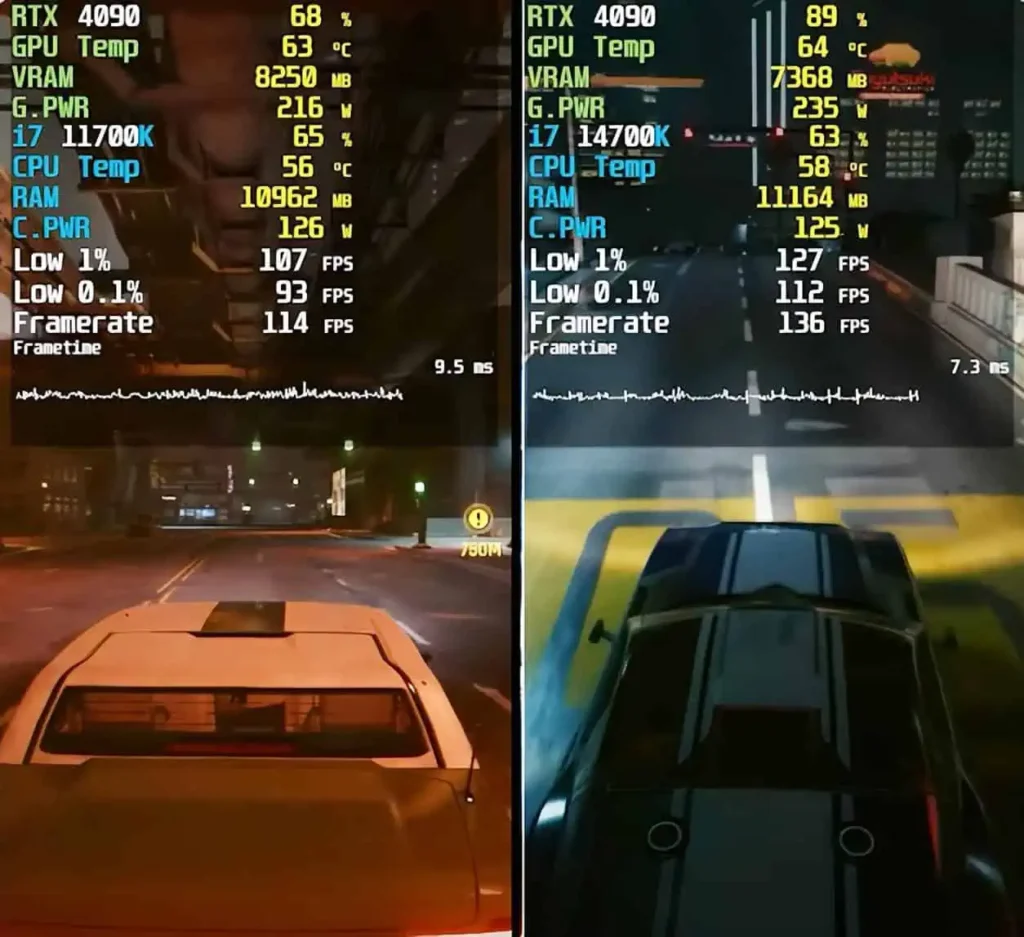
Core i7-11700K Platform:
- Average FPS: 114
- Lowest Instantaneous FPS: 107
- Frame time: 9.5ms
- CPU Usage: 65%
- Power Consumption: 126W
- Temperature: 56°C
- Memory Usage: 11.0GB
- GPU Usage: 68%
- VRAM Usage: 8.3GB
- GPU Power Consumption: 216W
- GPU Temperature: 63°C
Core i7-14700K Platform:
- Average FPS: 136
- Lowest Instantaneous FPS: 127
- Frame time: 7.3ms
- CPU Usage: 63%
- Power Consumption: 125W
- Temperature: 58°C
- Memory Usage: 11.2GB
- GPU Usage: 89%
- VRAM Usage: 7.4GB
- GPU Power Consumption: 235W
- GPU Temperature: 64°C
In this game:
- The CPU usage on the Core i7-14700K platform is 2% lower compared to the competitor, with memory usage 0.2GB higher.
- GPU usage is 21% higher, but VRAM usage is 0.9GB lower on the Core i7-14700K platform.
- On average FPS, the Core i7-14700K platform outperforms the Core i7-11700K by 22 FPS, with the lowest instantaneous FPS 20 FPS higher.
- The difference in frame time is 2.2ms.
- Power consumption is almost equal, but the temperature on the Core i7-14700K platform is 2 degrees higher.
Game 4: “Forza Horizon 5”
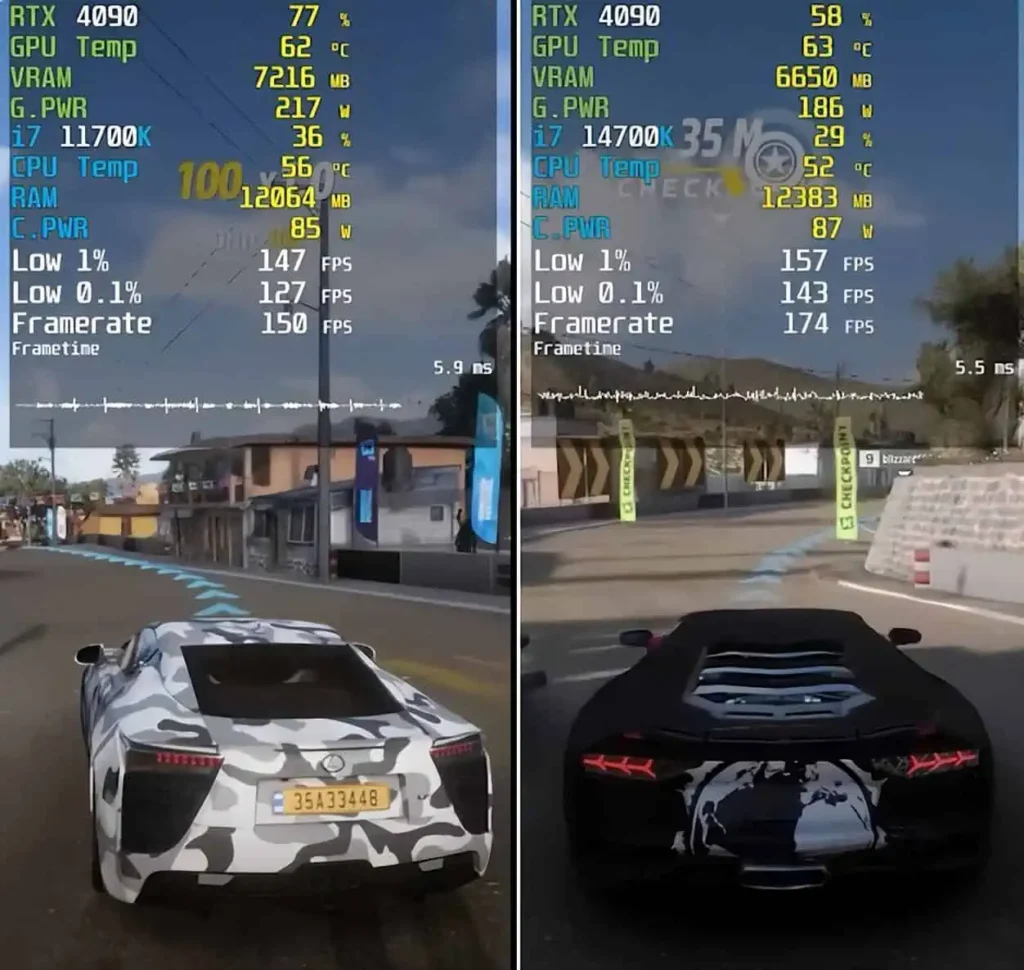
Core i7-11700K Platform:
- Average FPS: 150
- Lowest Instantaneous FPS: 147
- Frame time: 5.9ms
- CPU Usage: 36%
- Power Consumption: 85W
- Temperature: 56°C
- Memory Usage: 12.1GB
- GPU Usage: 77%
- VRAM Usage: 7.2GB
- GPU Power Consumption: 217W
- GPU Temperature: 62°C
Core i7-14700K Platform:
- Average FPS: 174
- Lowest Instantaneous FPS: 157
- Frame time: 5.5ms
- CPU Usage: 29%
- Power Consumption: 87W
- Temperature: 52°C
- Memory Usage: 12.4GB
- GPU Usage: 58%
- VRAM Usage: 6.7GB
- GPU Power Consumption: 186W
- GPU Temperature: 63°C
In this game:
- The CPU usage on the Core i7-14700K platform is 7% lower compared to the competitor, with memory usage 0.3GB higher.
- GPU usage is 19% lower, and VRAM usage is 0.5GB lower on the Core i7-14700K platform.
- On average FPS, the Core i7-14700K platform outperforms the Core i7-11700K by 24 FPS, with the lowest instantaneous FPS 10 FPS higher.
- The difference in frame time is 0.4ms, which is negligible.
- Power consumption is 2W lower, and the temperatures are almost equal between the platforms.
Game 5: “Hogwarts Legacy”
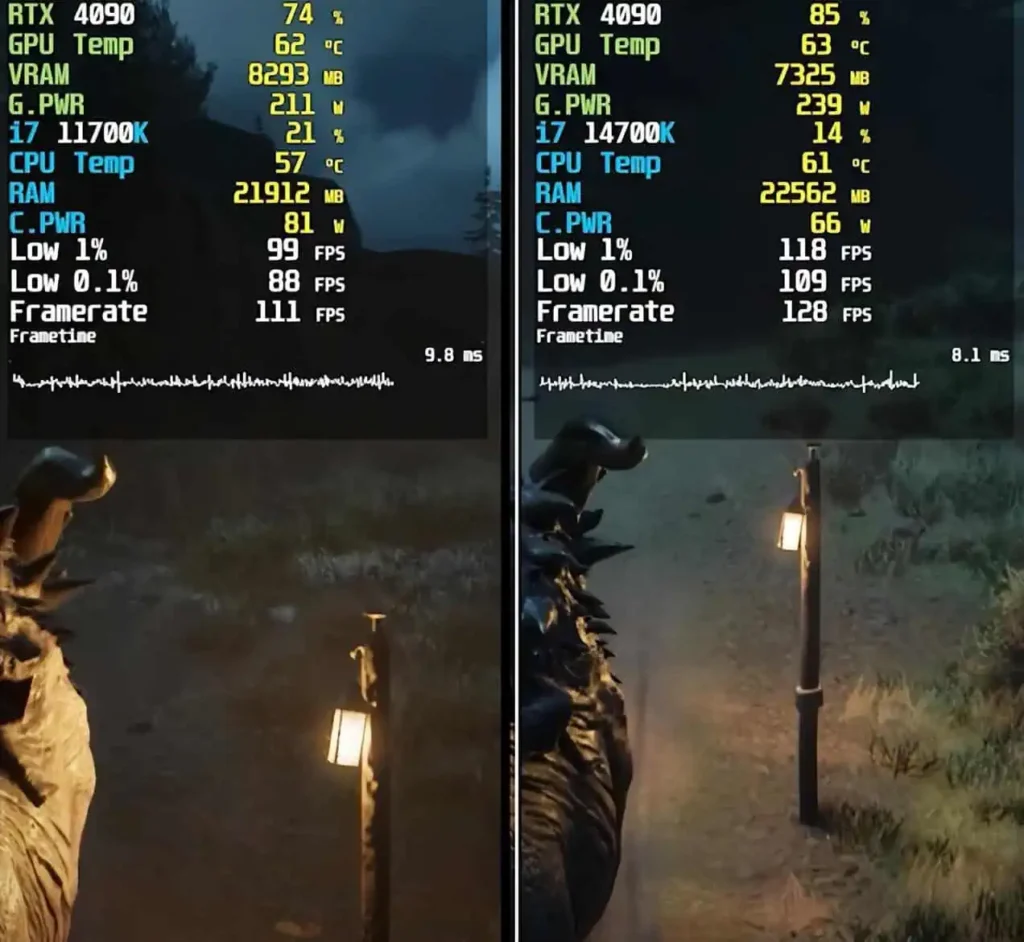
Core i7-11700K Platform:
- Average FPS: 111
- Lowest Instantaneous FPS: 99
- Frame time: 9.8ms
- CPU Usage: 21%
- Power Consumption: 81W
- Temperature: 57°C
- Memory Usage: 21.9GB
- GPU Usage: 74%
- VRAM Usage: 8.3GB
- GPU Power Consumption: 211W
- GPU Temperature: 62°C
Core i7-14700K Platform:
- Average FPS: 128
- Lowest Instantaneous FPS: 118
- Frame time: 8.1ms
- CPU Usage: 14%
- Power Consumption: 66W
- Temperature: 61°C
- Memory Usage: 22.6GB
- GPU Usage: 85%
- VRAM Usage: 7.3GB
- GPU Power Consumption: 239W
- GPU Temperature: 63°C
In this game:
- The CPU usage on the Core i7-14700K platform is 7% lower compared to the competitor, with memory usage 0.7GB higher.
- GPU usage is 11% higher, but VRAM usage is 1GB lower on the Core i7-14700K platform.
- On average FPS, the Core i7-14700K platform outperforms the Core i7-11700K by 17 FPS, with the lowest instantaneous FPS 19 FPS higher.
- The difference in frame time is 1.7ms and power consumption is 15W lower on the Core i7-14700K platform, while the temperature is 4 degrees higher.
Game 6: “The Last of Us Part I”
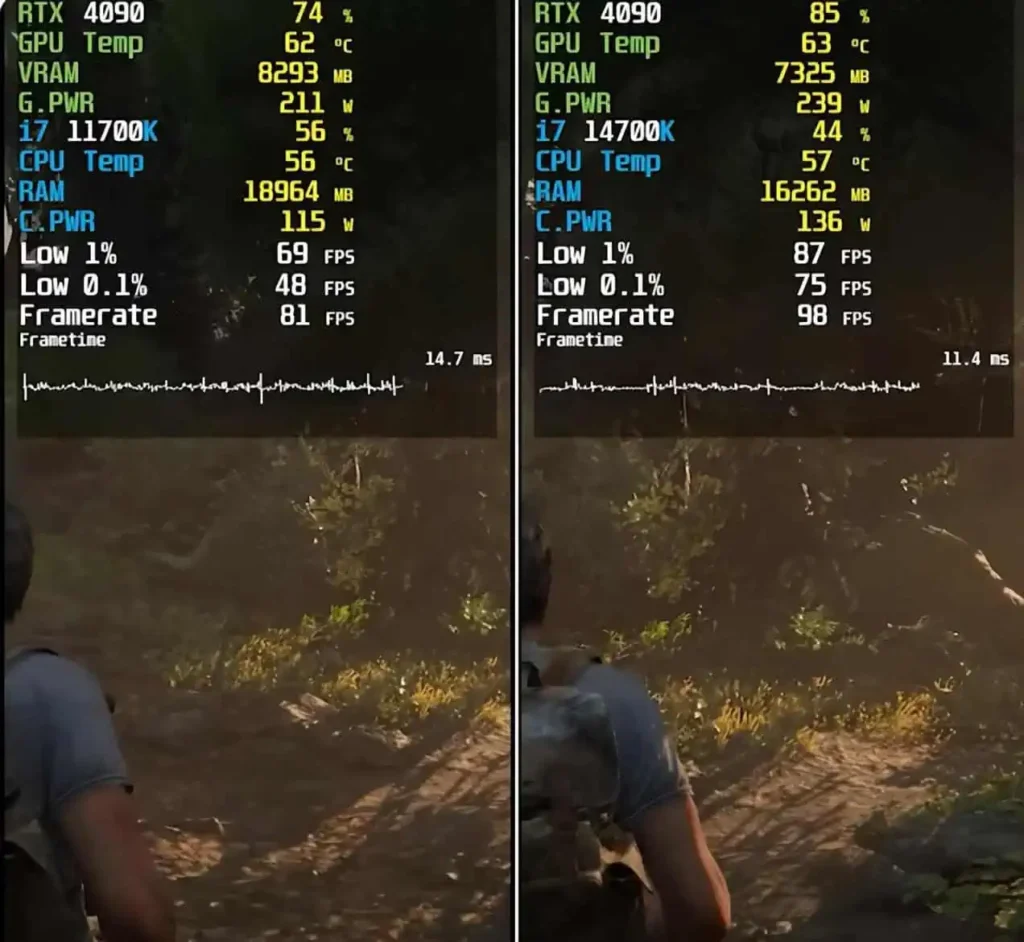
Core i7-11700K Platform:
- Average FPS: 81
- Lowest Instantaneous FPS: 69
- Frame time: 14.7ms
- CPU Usage: 56%
- Power Consumption: 115W
- Temperature: 56°C
- Memory Usage: 19.0GB
- GPU Usage: 74%
- VRAM Usage: 8.3GB
- GPU Power Consumption: 211W
- GPU Temperature: 62°C
Core i7-14700K Platform:
- Average FPS: 98
- Lowest Instantaneous FPS: 87
- Frame time: 11.4ms
- CPU Usage: 44%
- Power Consumption: 136W
- Temperature: 57°C
- Memory Usage: 16.3GB
- GPU Usage: 85%
- VRAM Usage: 7.3GB
- GPU Power Consumption: 239W
- GPU Temperature: 63°C
In this game:
- The CPU usage on the Core i7-14700K platform is 12% lower compared to the competitor, with memory usage 2.7GB lower.
- GPU usage is 11% higher, but VRAM usage is 1GB lower on the Core i7-14700K platform.
- On average FPS, the Core i7-14700K platform outperforms the Core i7-11700K by 17 FPS, with the lowest instantaneous FPS 18 FPS higher.
- The difference in frame time is 3.3ms, and the power consumption is 21W higher on the Core i7-14700K platform, while the temperatures are almost equal.
05
Comparative Conclusion
Despite being released three years ago, the Core i7-11700K still maintains robust performance, especially for gaming, demonstrating stability with average FPS generally falling short of Core i7-14700K by less than 20 FPS. Frame times usually stay within 10ms, even in demanding titles like “The Last of Us Part I,” where it remains under 15ms.
However, the gap between the Core i7-11700K and Core i7-14700K is noticeable. Throughout the tests, the Core i7-14700K consistently exhibited around a 10% lower CPU usage compared to the Core i7-11700K, while leveraging approximately 10% higher GPU performance and generally lower VRAM usage. Additionally, the power consumption of the Core i7-14700K didn’t significantly surpass that of the Core i7-11700K, maintaining relatively similar temperatures.
Therefore, from a gaming perspective, there’s entirely no necessity to upgrade if you’re currently using the Core i7-11700K. Its performance remains adequate for gaming purposes. If your gaming performance is lacking, the issue and bottleneck are unlikely to be the processor; instead, considering an upgrade to the graphics card would be more beneficial.
On the contrary, if you’re a commercial user valuing productivity performance, an upgrade might be advisable. Solely comparing gaming performance doesn’t comprehensively and objectively reflect the entire performance difference between these two processors. The overall comprehensive performance of the Core i7-14700K is notably stronger.

Related:

